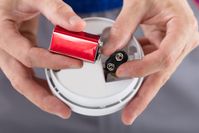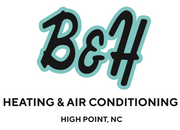Residential HVAC Service 101: Carbon Monoxide Detector Installation

Although it’s a type of residential HVAC service that doesn’t get its due, having a carbon monoxide detector installed is just important as having a smoke detector. Any time fuel is involved, there’s a chance carbon monoxide (CO) can reach dangerously high levels. Since many heaters and a few air conditioners use natural gas, the risk of CO poisoning is directly tied to your HVAC system. To learn more about this, consider the following.
Why You Need a Carbon Monoxide Detector
Carbon Monoxide Basics
Colorless and odorless, CO is formed at a point of combustion when there’s not enough oxygen in the air. When it comes to residential HVAC services, if your heaters, boilers, and furnaces aren’t properly ventilated, every time you turn on the pilot light, CO is produced. Once it accumulates and goes over 35 parts per million (ppm), it becomes poisonous.
Dangers of Carbon Monoxide
Even at 35 ppm, if a person is exposed to CO for half a day, they will start to experience symptoms like headaches, dizziness, and nausea. Those with heart issues will sometimes encounter chest pain as well. Prolonged or increased exposure can result in unconsciousness or death. As the levels rise, the time it takes for symptoms to appear will shorten. At 100 ppm, it’ll only take about three hours for symptoms to show up; at 200 ppm, about two hours.
Using Detectors
 For complete coverage, there needs to be at least one CO detector on every floor and inside, or nearby, every bedroom. They'll need to be tested regularly to ensure their functionality, and the batteries should be replaced every six months. Eventually, the units themselves will need to be replaced, too; this varies depending on the manufacturer, so be sure to follow their recommendations.
For complete coverage, there needs to be at least one CO detector on every floor and inside, or nearby, every bedroom. They'll need to be tested regularly to ensure their functionality, and the batteries should be replaced every six months. Eventually, the units themselves will need to be replaced, too; this varies depending on the manufacturer, so be sure to follow their recommendations.
How Detectors Can Save Lives
Like a smoke detector, the alarm of a CO detector will go off when the levels of CO get too high. If this happens and no one has exhibited symptoms, turn off any gas-powered appliances, open all the windows, head outside, then call the fire department. Because CO can’t be seen or smelled, you need to call the authorities. They’ll inspect your home and locate the source of the leak. If it goes off and someone has already started to feel sick, evacuate and call the fire department immediately. This essential residential HVAC service is a must for you and your loved ones, so protect your home soon.
If you’re in North Carolina’s High Point, Thomasville, or Triad area and concerned about carbon monoxide, call B & H Heating & Air Conditioning at (336) 841-5050. Licensed, bonded, and insured, this HVAC contractor can install a detector and make sure your heater and air conditioner are in no danger of a leak. Having issues with your heater and looking to have it repaired or replaced before winter hits? These are among their most popular residential HVAC services, so they’re on the case. For more information about what they can offer your home, visit their website.
About the Business
Have a question? Ask the experts!
Send your question

